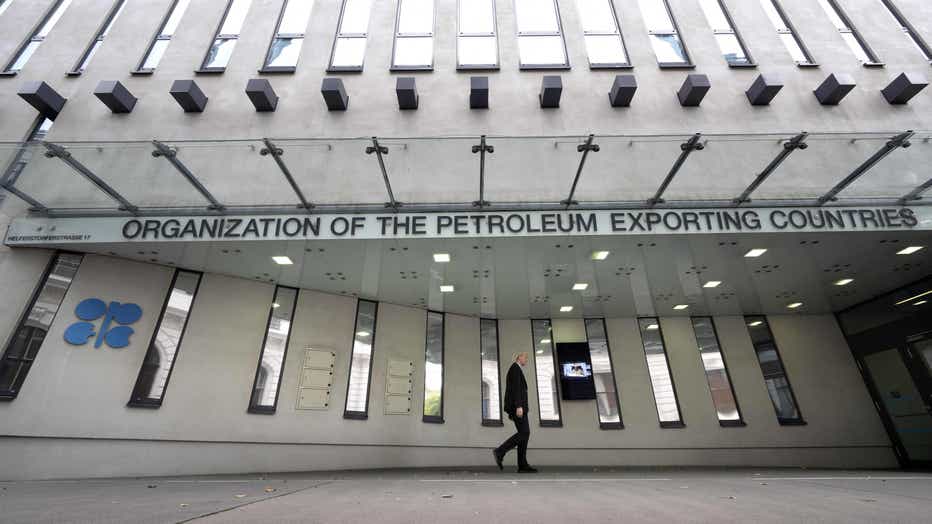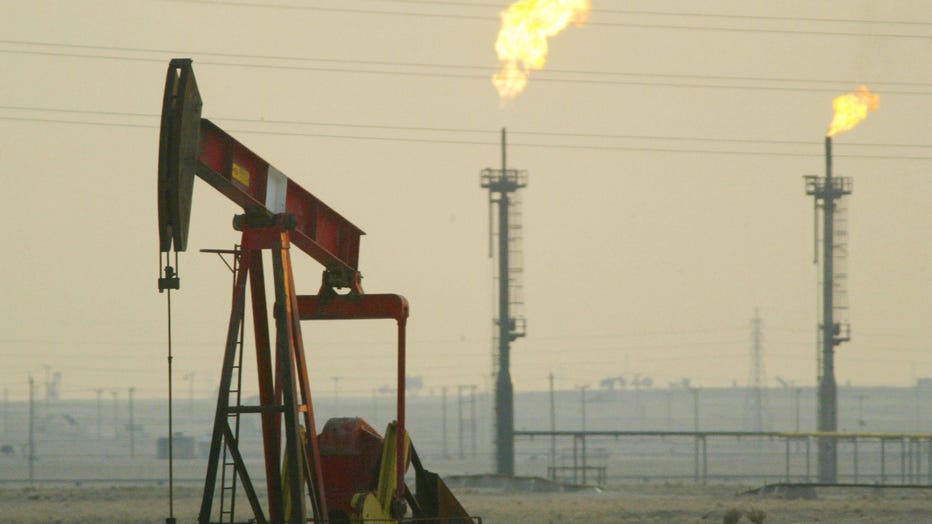OPEC+ approves sharp cut in oil output; gas prices could rise
The OPEC+ alliance of oil-exporting countries on Wednesday decided to sharply cut production to support sagging oil prices, a move that could deal the struggling global economy another blow and raise politically sensitive pump prices for U.S. drivers just ahead of key national elections.
Energy ministers meeting at the Vienna headquarters of the OPEC oil cartel cut production by 2 million barrels per day starting in November at their first face-to-face meeting since the start of the COVID-19 pandemic.
Besides a token trim in oil production last month, the major cut is an abrupt turnaround from months of restoring deep cuts made during the depths of the pandemic and could help alliance member Russia weather a looming European ban on oil imports.
In a statement, OPEC+ said the decision was based on the "uncertainty that surrounds the global economic and oil market outlooks."
RELATED: LA County, Orange County gas prices reach record high - again
The impact of the production cut on oil prices — and thus the price of gasoline made from crude — will be limited somewhat because OPEC+ members are already unable to meet the quotas set by the group.
The alliance also said it was renewing its cooperation between members of the OPEC cartel and non-members, the most significant of which is Russia. The deal was to expire at year's end.

A man walks past OPEC headquarters on October 4, 2022 on the eve of the 45th Meeting of the Joint Ministerial Monitoring Committee and the 33rd OPEC and non-OPEC Ministerial Meeting held on October 05, in Vienna, Austria. (Photo by JOE KLAMAR/AFP via
The decision comes as oil trades well below its summer peaks because of fears that major global economies such as the U.S. or Europe will sink into recession due to high inflation, rising interest rates meant to curb rising consumer prices, and uncertainty over Russia’s war against in Ukraine.
READ MORE: US hits Russia with more sanctions after Kremlin annexes Ukrainian territory
The fall in oil prices has been a boon to U.S. drivers, who saw lower gasoline prices at the pump before costs recently started ticking up, and for U.S. President Joe Biden as his Democratic Party gears up for congressional elections next month.
White House press secretary Karine Jean-Pierre told reporters Tuesday that the U.S. would not extend releases from its strategic reserve to increase global supplies.
Biden has tried to receive credit for gasoline prices falling from their average June peak of $5.02 — with administration officials highlighting a late March announcement that a million barrels a day would be released from the strategic reserve for six months. High inflation is a fundamental drag on Biden’s approval and has dampened Democrats’ chances in the midterm elections.
Oil supply could face further cutbacks in coming months when a European ban on most Russian imports takes effect in December. A separate move by the U.S. and other members of the Group of Seven wealthy democracies to impose a price cap on Russian oil could reduce supply if Russia retaliates by refusing to ship to countries and companies that observe the cap.

A derek pumps in an oil field. (Photo by Joe Raedle/Getty Images)
The EU agreed Wednesday on new sanctions that are expected to include a price cap on Russian oil.
Russia "will need to find new buyers for its oil when the EU embargo comes into force in early December and will presumably have to make further price concessions to do so," analysts at Commerzbank wrote in a note. "Higher prices beforehand — boosted by production cuts elsewhere — would therefore doubtless be very welcome."
Dwindling prospects for a diplomatic deal to limit Iran’s nuclear program have also lowered prospects for a return of as much as 1.5 million barrels a day in Iranian oil to the market if sanctions are removed.
Oil prices surged this summer as markets worried about the loss of Russian supplies from sanctions over the war in Ukraine, but they slipped as fears about recessions in major economies and China’s COVID-19 restrictions weighed on demand for crude.
RELATED: Gas prices at the pump worsen, an expert from Triple A knows why
International benchmark Brent has sagged as low as $84 in recent days after spending most of the summer months over $100 per barrel.
At its last meeting in September, OPEC+ reduced the amount of oil it produces by 100,000 barrels a day in October. That token cut didn’t do much to boost lower oil prices, but it put markets on notice that the group was willing to act if prices kept falling.


